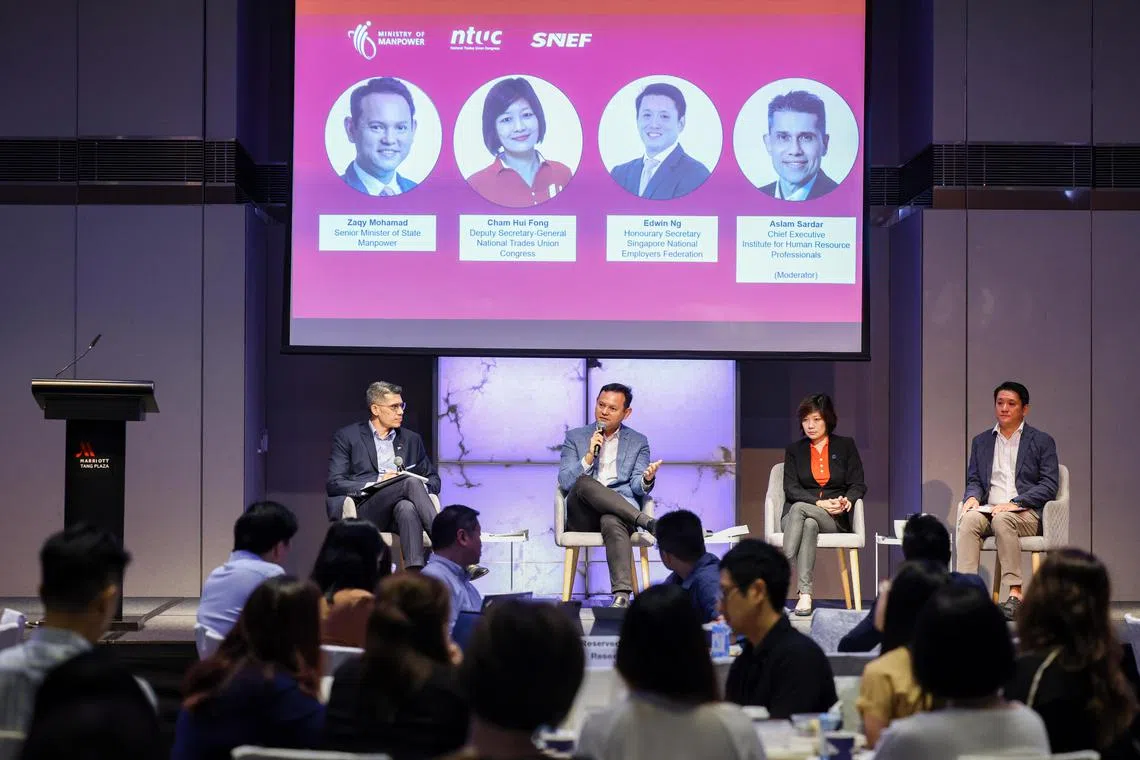Special arrangements, outsourcing among issues raised at dialogue on proposed workplace fairness law
Sign up now: Get ST's newsletters delivered to your inbox

Senior Minister of State for Manpower Zaqy Mohamad (second from left) speaking at the dialogue session at Singapore Marriott Tang Plaza Hotel.
PHOTO: MINISTRY OF MANPOWER
SINGAPORE – Would an employer need to extend alternative leave or remote work arrangements it offered one staff member to all other staff who ask for it to avoid seeming discriminatory?
This was among questions employers, human resource practitioners and workers asked panellists in a 1½-hour dialogue that touched on the impact, requirements and efficacy of proposed workplace fairness legislation on Thursday.
On the panel were Mr Zaqy Mohamad, Senior Minister of State for Manpower; Ms Cham Hui Fong, deputy secretary-general of National Trades Union Congress; and Mr Edwin Ng, honorary secretary of the Singapore National Employers Federation.
All three are members of the Tripartite Committee on Workplace Fairness, which released on Feb 13 an interim report on recommendations for the proposed Bill to protect workers against biases based on nationality, age and others, as well as new penalties on errant employers.
Attended by more than 200 people, the session at Singapore Marriott Tang Plaza Hotel was moderated by Institute for Human Resource Professionals chief executive Aslam Sardar.
The dialogue was held under Chatham House rules, which allow for reporting of what was said but not who said it to foster candour.
Responding to the question on alternative arrangements, one panellist said: “(At the) end of the day, we really have to look at the business exigencies, whether the company could run.”
The panellist added that if a company can explain reasonably why alternative arrangements are extended to some workers but not others, it would not fall afoul of the anti-discrimination law.
For instance, it may not be as feasible to grant staff who need to meet customers in person more work-from-home days upon request, the panellist said.
Another participant asked if the law would cover service buyers which impose discriminatory requirements on outsourced staff.
“What is the position of the Ministry of Manpower if companies are perceived to be discriminatory, but they are actually forced into that kind of behaviour by the service buyers? Would we want to hold the service buyers accountable for such discriminatory practices as well?”
One panellist said: “If you allow for that, then the employers have no choice but to also be discriminatory, so I don’t think we should actually allow for that.”
The panellist added that the tripartite committee will grant exceptions where needed, such as to religious organisations for roles that require workers to profess the same religion. But these will not be blanket exemptions.
Citing kindergartens run by religious organisations as an example, the panellist said: “There’s hardly any reason to say, ‘All my other workers must be of the same faith,’ because you may be run by a faith-based organisation but the teacher certainly does not have to be (of the same religion). They’re not religious workers.”
Attendees also asked about mandating the hiring of at least one certified human resource professional, how the success of the proposed law will be measured and how staff who are discriminated against can be convinced to file a report.
In his opening remarks, Mr Zaqy said the workplace fairness law will provide clearer rules, in addition to allowing more proportionate action to be taken against errant firms.
Under the existing Tripartite Guidelines on Fair Employment Practices, enforcement against such firms is based on curtailing their work pass privileges, he said.
“However, this may be deemed as excessive to some employers or inadequate to employees as there is no redress for them.”
Mr Ng told reporters that although the proposed law’s biggest message is deterrence, he encouraged employers to focus on the positives.
“The focus should be on the other end of the spectrum, which is to uplift the standards of HR practices within companies to enable every employee to have a fair chance at work, to help them feel confident and motivated within the workplace.”


